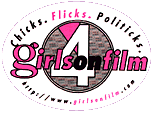

Lise Carrigg: Girls on Film
interviewed by Emma Taylor on August 12, 1996


Lise Carrigg is a co-founder of Girls on Film, a site devoted to "chicks, flicks and politicks." GOF began as an ITP project and was recently recognized as one of the Indie 30 of the Web. Carrigg talks to Tripod about movies, community and kickbutt girls on the Web.
Tripod: Why did you start Girls on Film?
Lise Carrigg: Girls on Film started as a class project when I was in Stacy Horn's (founder of ECHO) class at ITP (Interactive Telecommunications Program at New York University). Even though it was just a class assignment to prove that we had learned basic HTML and how to use Fetch, I took it very seriously. I knew from the very beginning that we were doing something very original, stylistically and content-wise.
I remember that we sent this whole series of email messages back and forth, saying things like, "Call me if you get this message." We were very untrusting of the Internet at that point. About a month later, we had the shell of Girls on Film, and we just celebrated our 1 1/2 year birthday! The "Girls" -- Sibyl Goldman, Andrea Pyros, Clare Bundy and myself -- all live in New York. We all share a deep interest in media issues, and an even deeper interest in having a "place" where we can say whatever we want and make it look however we want.
Tripod: You were all at ITP together?
LC: We all went to Vassar College in Poughkeepsie, NY. I am the only one of the Girls that went to ITP. We are all similar, in terms of demographics, but our perspectives are different. When we meet, we have all these ideas that we've been thinking about all week at our desks and on the subway. That's also the idea behind our Guest Girls and Just One Boy.
Movie Reviews
by Girls On Film.
Tripod: Which element is more important -- the "Girls" or the "Film"?
LC: The "Girls" element is definitely more important than the "Film," because our being women sets the tone for our site. Our whole philosophy is subjectivity. Instead of remaining aloof and discussing the mis-en-scéne of a movie, we tell you basically where we're coming from and what we felt about the movie. We also firmly believe that -- and we do not mean any disrespect to more academic film and media critics -- there are many factors that influence whether or not you like a film. Maybe it's so hot out that you will like ANY movie because you get to sit in an air-conditioned theater. Maybe you just experienced a personal loss and you're poised to cry. A movie could touch you because it addresses something that is happening in your life at that particular moment.
This is why we are very upfront about who we are. People get to know and identify with us and our separate tastes. We recently got an email that said: "Why do I love these reviews so much? Because it's exactly what I thought! Even if I haven't seen the movie, that's what I thought too!" We also get a lot of mail that says things like: "Lise, I CAN'T BELIEVE you liked ---------!" People address us in a very personal, laid-back way. It's funny, even if you tell people only a few things about yourself, like we have done on our bios page, they can still get a feel for who you are, based on what current trend you say you hate the most, what you report as the last book you read, the way you write your reviews, and the way the site looks and feels. I feel confident that if novels were our major interest, we could easily switch over to "Girls on Novels," and have the same sassy feel because of who we are.
Tripod: If you compare "girls' stuff" on the Web with the most popular women's print magazines, there is a huge difference in the approach the two take to their audience. Most of the popular women's sites on the Web are pretty chatty, kickbutt, and make no apologies for being girly (and I would include GOF in this category). As opposed to the "get on a diet/get your man" attitude of women's print magazines. Do you agree? Why do you think this is?
LC: I definitely agree and this is what I love about a lot of "women's and girls' stuff" on the Web. I think it's because on the Web, you have these entire huge projects that are often totally conceptualized, designed, written, edited, and programmed by women. This accounts for some of the "kickbutt" feel -- there's no doubt that it's a kickbutt feeling to type in your URL, look at your site and say, "Whoa, we made this whole damn thing! And we did it on weekends and at night, after our other jobs, and we learned how to do it from books and from each other." And then once you start to get a lot of loyal fans and e-mail, the difference between print mags and the Web is again apparent. We try to answer every single e-mail we get with a personal response (although I will admit that we are a little behind right now). A while back, we ran an article on the proliferation of rape scenes in recent movies and we got about 150 responses; most of them were incredibly well thought-out and articulated. So we did a follow-up article featuring the mail. There's so much flexibility when you don't have to "go to press" three weeks before hitting the newsstand.

Embarrassing moments and
missing superstars
are found in Bad Coiffs and MIAs.
Tripod: Do you sense a girls' "movement" on the Web, or is it just a bunch of girls each doing their own thing?
LC: I think of a movement as lots of different people organizing and coming together for a specific cause. As far as the Web goes, I actually think it's more of the latter -- but without the "just." "A bunch of girls each doing their own thing" -- that sounds really great to me! I am all for women coming together to share our skills and ideas, like with Webgrrls. But in the end, I'd rather have lots of girls and women out there writing about/working on their specialties, rather than everyone feeling the need to always come together over one specific issue.
Tripod: Your explanation for why girls' stuff on the Web has so much attitude has a lot to do with the start-up nature of these ventures. Will this fade as the Web becomes more established, and more corporate?
LC: I am pretty optimistic that zines like Girls on Film, gURL, Foxy, etc will survive on the Web. The hard part is now, when people are totally confused about how to make a successful site, how to make money, and what standards and models should be used. We are going through all the same stuff right now: we aren't making any money at all!
And we wonder, do we need to make the site more interactive? More technologically advanced? Should I be spending my weekends learning Perl and CGI scripting? When does it stop being a hobby and become your main focus? For now, it is not financially an option for any of us to stop working at our other jobs. On the other hand, we know that we have a good solid publication and a lot of loyal readers. We have determined some things, like that the magazine model works quite well for us. That's not to say that I think all Web sites would work with this model of pages, articles, and sections. I like a lot of sites that are much more technologically experimental than we are.

What's goin' on with the Girls,
including campaign analyses.
Tripod: What happens to GOF next?
LC: We just moved to our new home at www.girlsonfilm.com. ITP has been great to us, but we are looking to grow and that, of course, means money. So I figured we'd get off the educational server before they gave US the boot! It's hard to say what will happen; we've had several "interested parties" but so far nothing has totally panned out. We're very particular in that we don't want huge banner across the top of every page and we still want total freedom of speech. So, we don't want to get into a situation where we're bankrolled by a studio, and then we have to say that we loved all their movies: "'Kingpin' was brilliant! A tour de force!" We are also proud participants in Indiefest, to be held in New York in September. Maybe that'll be our lucky break. But we're not going away for a while, that much is certain.
Tripod: Will you keep films the main focus of your site?
LC: I think that we'll broaden our horizons and become more of a "Girls on All Things Media." We already have a more political Girls on the Campaign Trail series and we've had very favorable response to this. We've also written opinion pieces on "Wired" magazine, "Vanity Fair," and, as I mentioned, rape scenes in movies. Upcoming features include "Everyone's a Critic" where we discuss the nature of film criticism and criticism in general.
Some people think of critics as people who just get to kick back and tear apart work that people took years to do. But I think of what we do as a similar process to making a very, very low-budget movie. We've been working on Girls on Film for a year to get it where we want it, we've taken some risks and we've wondered many times, "Do we quit our jobs now to do this?" And we still get loads of criticism too. Basically, wherever you are, there's someone higher up the totem pole who gets to criticize you.
Tripod: You've talked a lot about the community of readers you have. This is what ultimately distinguishes Web zines from print ones. What is it about the Web that makes people feel they can be so casual and personal with each other?
LC: I think a lot of this has to do with the way we set up Girls on Film. We all use our first names only, we all tell a little bit about ourselves, and we answer all of our e-mail personally. If I read an article in the New Yorker and I strongly disagree with the sentiment, what do I do? If I write a letter to the author, care of "The New Yorker," will it ever get to him or her? What are my chances of getting a personal response? Even if my letter gets printed, I most likely won't get any response from the author. It's the same way with large corporate Web sites. I was looking for an alcohol sponsor for a Girls on Film party that we are having, so I went to a lot of Web sites of major alcohol companies. I sent a bunch of e-mails to these sites and I noted that the e-mail addresses were usually "[email protected]." No one's name, just "info." Stolichnaya was the only company who answered my e-mail.
It's not just the Web that allows this exchange to occur. When it comes right down to it, that is the decision of the people in charge. How "in touch" do you want to be? In our case, we decided that this was very important to us, so we posted our e-mail address all over the site. In the case of some huge corporation, this is usually not very important. So they bury the e-mail address on level five of the site and then when someone like me finds it and writes in, the message gets ignored. In our case, we'd rather send a personal reply -- even if it is a month late -- than send a form letter reply or totally ignore people.
Tripod: What might that sense of community lead to?
LC: What it can lead to is things like the Guest Girl column, the Just One Boy column, and the You Say We Say section of our site. These sections all feature other peoples' opinions. And these opinions give us a jumping-off point for other articles. People are constantly making us defend ourselves, or re-think things that we wrote.
